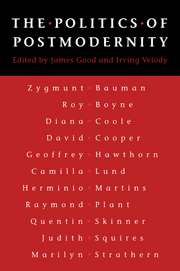Book contents
- Frontmatter
- Contents
- Acknowledgements
- Notes on contributors
- 1 Introduction: postmodernity and the political
- Part I Modernity and its vicissitudes
- 2 Parvenu and pariah: heroes and victims of modernity
- 3 Private and public in ‘late-modern’ democracy
- 4 Modernity and disenchantment: some reflections on Charles Taylor's diagnosis
- 5 Postmodernism and ‘the end of philosophy’
- Part II The critique of modernist political thought
- Part III Technology and the politics of culture
- Index
5 - Postmodernism and ‘the end of philosophy’
Published online by Cambridge University Press: 05 June 2012
- Frontmatter
- Contents
- Acknowledgements
- Notes on contributors
- 1 Introduction: postmodernity and the political
- Part I Modernity and its vicissitudes
- 2 Parvenu and pariah: heroes and victims of modernity
- 3 Private and public in ‘late-modern’ democracy
- 4 Modernity and disenchantment: some reflections on Charles Taylor's diagnosis
- 5 Postmodernism and ‘the end of philosophy’
- Part II The critique of modernist political thought
- Part III Technology and the politics of culture
- Index
Summary
Writing of such recent fashions as deconstruction and Foucauldian ‘genealogy’, Habermas concludes that ‘the drapery of philosophical concepts’ they display only ‘serves as the cloak for a scantily concealed end of philosophy’. In fact, several self-proclaimed postmodernists, like Lyotard and Rorty, as well as some of their heroes, like Heidegger, have been willing to lay it all bare and announce the end of philosophy.
My aim in this chapter is diagnosis. I want to understand the character of this verdict on philosophy, to locate it in relation to earlier obituaries, and to identify the exact issue on which assessment of the verdict must hang.
First, though, a disclaimer. Rorty now wishes he had not used ‘postmodernist’ in earlier essays, since he has ‘given up on the attempt to find something in common’ to postmodernist architecture, literature, music and philosophising. It may be that Rorty gives up too soon, and at the very end I shall suggest that a central feature of the postmodernist attitude towards philosophy is at least analogous to one characteristic of postmodernist cultural trends at large. Until then, however, I shall not be concerned with these larger dimensions of culture. It is possible, I believe, to discern the main contours of what, for better or worse, is dubbed postmodernist philosophising without becoming too taxed by its connections with the architecture of Venturi or the photography of Sherry Levine.
- Type
- Chapter
- Information
- The Politics of Postmodernity , pp. 61 - 72Publisher: Cambridge University PressPrint publication year: 1998
- 1
- Cited by



